

Daño cerebral por ictus o cuando un neurotransmisor se convierte en neurotoxina. Gracias a la colaboración entre investigadores vascos del centro Achucarro (Achucarro Basque Center for Neuroscience), la Universidad del País Vasco (UPV/EHU) y el CIC biomaGUNE se ha descubierto un nuevo mecanismo que contribuye a que conozcamos mejor el daño neuronal que se da en los episodios de isquemia cerebral o ictus.
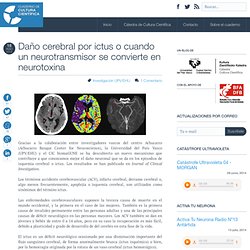
Los resultados se han publicado en Journal of Clinical Investigation. Explainer: What are endocrine disruptors? Hormones are like the managers of the body’s organs and other tissues.
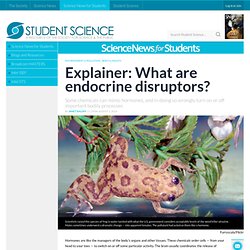
These chemicals order cells — from your head to your toes — to switch on or off some particular activity. The brain usually coordinates the release of hormones, sending these managers to a particular job site when it’s time for work to begin. But sometimes industrial chemicals and pollutants can mimic these managers. When such imposters enter the body, they can alter when or how an organism develops, what it looks like — even whether it gets some disease. Toxicologists — the scientists who study the action of poisons — have begun referring to these hormone mimics as endocrine disruptors.
Discovery of new pathways controlling the serotonergic system. With the aid of new methods, a research team at Karolinska Institutet have developed a detailed map of the networks of the brain that control the neurotransmitter serotonin.
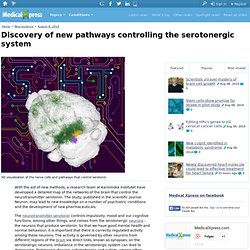
The study, published in the scientific journal Neuron, may lead to new knowledge on a number of psychiatric conditions and the development of new pharmaceuticals. The neurotransmitter serotonin controls impulsivity, mood and our cognitive functions, among other things, and comes from the serotonergic neurons – the neurons that produce serotonin. Spark of life: Metabolism appears in lab without cells - life - 25 April 2014. Metabolic processes that underpin life on Earth have arisen spontaneously outside of cells.
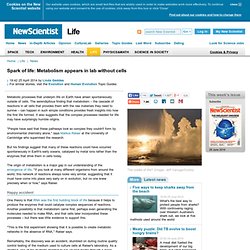
Identification of Putative Steroid Receptor Antagonists in Bottled Water: Combining Bioassays and High-Resolution Mass Spectrometry. Endocrine disrupting chemicals (EDCs) are man-made compounds interfering with hormone signaling and thereby adversely affecting human health.
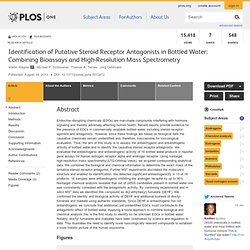
Recent reports provide evidence for the presence of EDCs in commercially available bottled water, including steroid receptor agonists and antagonists. However, since these findings are based on biological data the causative chemicals remain unidentified and, therefore, inaccessible for toxicological evaluation. Mini drug factory churns out drugs from inside bone - life - 18 September 2013. IMAGINE never having to take a pill again.
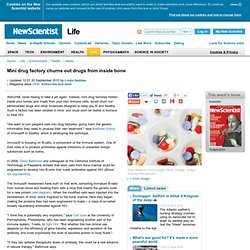
Instead, mini drug factories hidden inside your bones, and made from your own immune cells, would churn out personalised drugs and other molecules designed to keep you fit and healthy. Such a factory has been created in mice, and could soon be tested in humans to treat HIV. "We want to turn people's cells into drug factories, giving them the genetic information they need to produce their own treatment," says Matthew Scholz of Immusoft in Seattle, which is developing the technique. The Transcription Factor CREB Enhances Interleukin-17A Production and Inflammation in a Mouse Model of Atherosclerosis.
Sci.
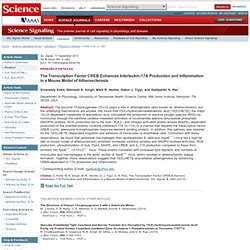
Signal., 17 September 2013 Vol. 6, Issue 293, p. ra83 [DOI: 10.1126/scisignal.2004214] Sivareddy Kotla, Nikhlesh K. Singh, Mark R. Which comes first? USU biochemists 'cracking code' of nitrogen fixation. Utah State University scientists have published two papers in a high profile academic journal this week that unlock mysteries of a chemical process upon which all life on earth depends.

In each paper, the researchers, under the leadership of USU biochemistry professor Lance Seefeldt, describe newly discovered insights about nitrogen fixation, a process that converts life-sustaining nitrogen into a form that humans, animals and plants can access. Protein research key for improved metabolism. Unlocking the mysteries of a certain type of protein could help reduce diet-induced obesity and type 2 diabetes by limiting weight gain, insulin resistance and glucose intolerance.
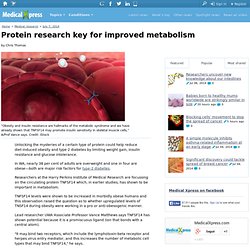
Study unlocks origin of brown fat cells important in weight maintenance. In ongoing research aimed at battling obesity, UT Southwestern Medical Center researchers have deciphered how new fat cells are formed in energy-storing fat pads.
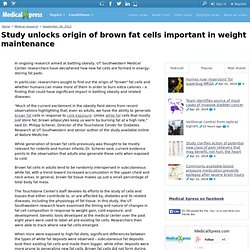
Stress Eaters Beware: You May Burn Fewer Calories. A double-patty cheeseburger and fries may be one of the worst things to eat after a stressful argument. New research suggests that for a day after being stressed out, people have slower metabolisms and burn fewer calories. The findings suggest that regularly eating high-fat meals after being stressed could lead to additional weight gain, the researchers said.
Endocrine disorders: the impact of stress and epigenetics. Endocrine disorders span a range of conditions, from diabetes and thyroid disease to stress-related conditions. Stress has been linked to a number of health problems, with the most recent evidence suggesting its involvement in male infertility, allergies and headache. During the normal stress response, glucocorticoid hormones secreted by the adrenal glands cause several physiological effects, but chronic stress can result in continual release of these hormones, leading to serious mental and physical health problems.
The impact of stress on chronic disease In a video Q & A published in BMC Medicine, George Chrousos talks about the impact of stress on chronic non-communicable diseases including obesity, metabolic syndrome, type 2 diabetes, hypertension and anxiety. He discusses how psychological and economic factors affect stress and describes how stress can be prevented by eating a healthy diet, being physically active and having a stable sleep-wake cycle.